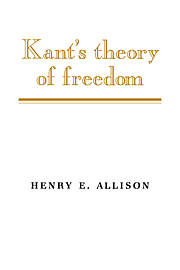Book contents
- Frontmatter
- Contents
- Acknowledgments
- Note on sources and key to abbreviations and translations
- Introduction
- Part I Freedom and rational agency in the Critique of Pure Reason
- Part II Moral agency and moral psychology
- Part III The justification of morality and freedom
- 11 The Reciprocity Thesis
- 12 The deduction in Groundwork III
- 13 The fact of reason and the deduction of freedom
- Notes
- Bibliography
- Index
13 - The fact of reason and the deduction of freedom
Published online by Cambridge University Press: 05 June 2012
- Frontmatter
- Contents
- Acknowledgments
- Note on sources and key to abbreviations and translations
- Introduction
- Part I Freedom and rational agency in the Critique of Pure Reason
- Part II Moral agency and moral psychology
- Part III The justification of morality and freedom
- 11 The Reciprocity Thesis
- 12 The deduction in Groundwork III
- 13 The fact of reason and the deduction of freedom
- Notes
- Bibliography
- Index
Summary
Kant's appeal to the fact of reason in the Critique of Practical Reason has been greeted with even less enthusiasm than the ill-fated attempt at a deduction of the moral law in Groundwork III. The general consensus appears to be that even though this deduction failed, it was at least a step in the right direction. Consequently, by abandoning the effort to provide a deduction of the moral law and relying instead on a brute appeal to a putative fact of reason, which in turn is supposed to provide the basis for a deduction of freedom, Kant in effect reverted to a precritical dogmatism of practical reason. As Schopenhauer puts it, in commenting on the acceptance of this conception by Kant's followers:
Thus in the Kantian school practical reason with its categorical imperative appears more and more as a hyperphysical fact, as a delphic temple in the human soul. From its dark sanctuary oracular sentences infallibly proclaim, alas! not what will, but what ought to happen.
In the present chapter I shall argue that far from being a reversion to a discredited standpoint, Kant's turn to the fact of reason marks a genuine advance, indeed, that given the basic principles of Kant's philosophy, it offers the best available strategy for authenticating the moral law and establishing the reality of transcendental freedom. I shall also argue that given these principles, this strategy is reasonably successful on both counts, although it can hardly be expected to convince someone who rejects either the account of morality as based on a categorical imperative or transcendental idealism.
- Type
- Chapter
- Information
- Kant's Theory of Freedom , pp. 230 - 249Publisher: Cambridge University PressPrint publication year: 1990



